LIVING IN THE DANGER ZONE 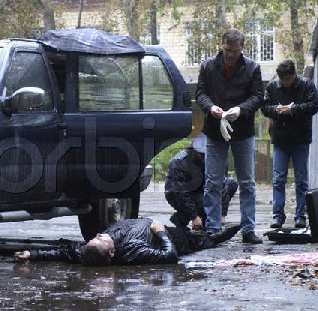
by Michael Hammerschlag
HAMMERNEWS
Printable Jill Carroll safe 3/30/06
Bob Woodruff seriously wounded by IED NPR comment (realplayer) goto 9:29 2-6-6 CapGazette Attack Cmnt
From 1991-1994 I was a reporter in Russia, as the Soviet Empire ripped apart;
living mostly as a (well off) Russian, and
immersed in a very foreign culture.
The day I arrived, Chechnya declared independence-
within 2 months the Soviet Union would collapse
into 14 Republics, the Cold War would officially
end, the Communist Party would be banned,
Gorbachev would be tossed out of the Kremlin
by Yeltsin on Christmas Day, prices would
go up 4 fold in 2 weeks, 26 fold by the end of 1992, and I would be kidnapped
at gunpoint by Mafiya goons in St. Petersburg,
driven in the woods, and stripped of everything
but my life… and that was… on the table. Fear is death in that situation; Russians despise weakness. The leader was a dead ringer
for German actor Klaus Maria Brandauer (Out of Africa)- one trusts movie stars, and every Russian
wanted to drag you home to food, drink, and
family- Americans were near royalty in the
euphoria over their sudden freedom.
After that, I went incognito, dressed in a ratty coat,
didn’t speak English or admit I was American,
and claimed to be Polish or Baltic if pressed.
Security was dominant- and safety lay in
anonymity. Until Iraq, the former Soviet
Union was the most dangerous place in the
world for journalists- contract murders and
attacks by beatings, ax, or acid… were common
by Mafiya, businessmen, or government people
enraged at reporters' stories. Radio Free Europe counted 120 dead journalists from 1992-2001. In Ukraine a once reformist President was allegedly taped plotting the murder of a critical reporter- whose headless corpse
was discovered months later. No one is ever caught or punished. My semi-professional
video camera, worth a lifetime's income
to Russians who then made $8 a month, didn’t
come out much in public after that. ADDENUM: The most savagely attacked target- Novaya Gazeta had 15 or so reporters killed, later I wrote for them too- told the Editor: "It would be an honor."
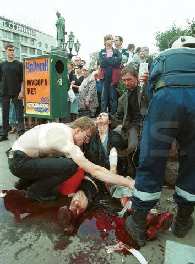 They had my notebook with itemized video
gear, addresses and phone numbers, 7 good
picture ID’s, and a map showing my apartment.
A week later, a skinhead thug followed me
and my girlfriend home on the last subway,
and like something straight out of The Hitcher, hopped into our cab after we thought we’d given him the slip.
We waited 2 minutes on the brightly lit curb
as the cab pulled up 100 ft, idled, then
finally roared off in a U-turn. He knew which street
I lived on and my world got smaller and colder.
They had my notebook with itemized video
gear, addresses and phone numbers, 7 good
picture ID’s, and a map showing my apartment.
A week later, a skinhead thug followed me
and my girlfriend home on the last subway,
and like something straight out of The Hitcher, hopped into our cab after we thought we’d given him the slip.
We waited 2 minutes on the brightly lit curb
as the cab pulled up 100 ft, idled, then
finally roared off in a U-turn. He knew which street
I lived on and my world got smaller and colder.
The overt approach, in Iraq: traveling in bulletproof SUV’s, armed convoys,
chase cars, machine gun toting security guards.. shared the same failing as the covert- it
was completely isolating. Whether being
low-key or traveling in battle formation,
one couldn’t question the people as a reporter. Like courageous poor Jill Carroll, I chose
the covert approach- I could observe, occasionally
question people, and be relatively safe.
But there were constant trade-off’s. I couldn’t
buy furniture, or a color TV ($3 for new
27"), or a stereo, or even a mirror;
because I didn’t want taxi drivers to see
where I lived, lest they tell the wrong people.
Assassinations always happened at the entrance
to apartments. Getting into the 85% private
vehicle “cabs” was now difficult, especially
late at nigh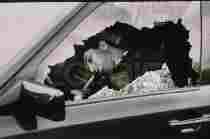 t.
t.
After I’d almost gone like a sheep to slaughter,
I resolved to fight, no matter what- and
successfully resisted Georgian muggers when
midnight strolling on Moscow’s Ring Road
in July, and street punks in Irkutsk who
demanded money. Fight or flight was a difficult
decision. A Russian high-strung magazine
financial manager carried a gun in his briefcase,
though I thought he'd hurt himself first.
Guns were so common, they’d be checked at
the fancy nightclubs along the coat racks
like umbrellas. In the '93 Gang War, bombings
and shootings happened regularly by Pushkin Sq., where I wrote for
2 papers.
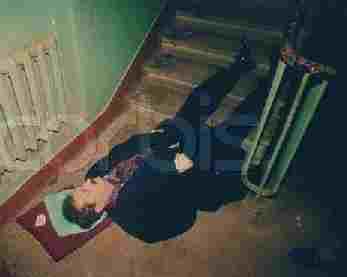 2 years later, strolling home the Ľ mile
from the subway in a secluded residential
area, a BMW slowed down by me, then went
on. 100 feet from my apartment door at 1am,
4 huge guys appeared on an intersecting course,
this was it- I’d dreamed of this in nightmares… but one
of them didn’t want to do it, and I speed-walked
to the entrance, sprinted to the 4th floor, took the elevator to 8, and sent
it down to 6. Within 30 seconds, they camped
on my landing, loudly chatting- with the
first crash of the splintering door, I hoped
to swing down off my balcony onto my downstairs
neighbor’s. By then I’d criticized the Mafiya gangs (scrl rt.), the Communist Parliament, Yeltsin’s crushing of other powers, and the rampant corruption in articles
in 5 Moscow English newspapers. It didn’t
happen- maybe it was a message, but in Russia,
the threat was a constant low grade fever,
erupting into serious danger maybe 10 times.
Forbes editor Paul Klebnikov, machine gunned leaving work in 2004, was the brother of
an editor of mine.
2 years later, strolling home the Ľ mile
from the subway in a secluded residential
area, a BMW slowed down by me, then went
on. 100 feet from my apartment door at 1am,
4 huge guys appeared on an intersecting course,
this was it- I’d dreamed of this in nightmares… but one
of them didn’t want to do it, and I speed-walked
to the entrance, sprinted to the 4th floor, took the elevator to 8, and sent
it down to 6. Within 30 seconds, they camped
on my landing, loudly chatting- with the
first crash of the splintering door, I hoped
to swing down off my balcony onto my downstairs
neighbor’s. By then I’d criticized the Mafiya gangs (scrl rt.), the Communist Parliament, Yeltsin’s crushing of other powers, and the rampant corruption in articles
in 5 Moscow English newspapers. It didn’t
happen- maybe it was a message, but in Russia,
the threat was a constant low grade fever,
erupting into serious danger maybe 10 times.
Forbes editor Paul Klebnikov, machine gunned leaving work in 2004, was the brother of
an editor of mine.
Freelancers like Jill Carroll have to be
twice as good, yet get a fifth the money
and respect of staff reporters, who often
huddle in the Green Zone and repeat
official pronouncements. Suffering from the
lack of power, water, food, health, finances,
and security- freelancers are unable
to afford bulletproof cars or security guards.
Says CSM Iraq contributor Christina Asquith, "Baghdad
on a budget brings only trouble, as the majority
of Western reporters kidnapped or killed
in Iraq have been freelance... In early 2004,
I considered hiring two armed guards to proved
round-the-clock protection for the house
I shared in Baghdad. The lowest amount we
were quoted was a prohibitive $30,000 a month..
Like most newspapers, The Monitor paid a
set amount per story, plus the cost of a
translator and driver. Adding security would
have more than treble the costs. I feared
the editors might reject my story as too
expensive. So I never asked for it; they
never offered." Carroll speaks Arabic, something I doubt 90% of official staff
correspondents there do, and knows the country
well enough to make people taste it and feel
it. Such excellence often isn’t appreciated
by editors who want reporters to write in
the dry football game style of US media-
who’s up; who’s down- just give me the score
without the shades of grey. But in a complex
roiling place like Iraq or Russia, that’s
foolish, and wasteful of her talents and
sacrifice.
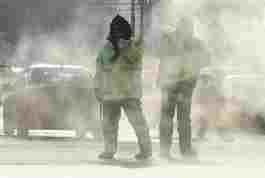 In Russia, it’s deeply painful to see every
press venue crushed by Putin, even the most powerful billionaires.
Without a free and vibrant press, democracy
doesn’t work- something to think about when
one wonders why it took the press 4
years to notice the mounting Administration
and Republican scandals. Besides deadly threats,
7 month winters with –10F every second day and 4 hours
of daylight, lack of Western movies or TV,
5 weeks of bronchitis-pneumonia, abusive clerks (pan right) and officials; I suffered giarrdia for 2
years- the water was endemically contaminated
and I didn’t realize my chemical treatments
weren’t effective- treating it with drugs
just meant the bugs would develop resistance.
In Russia, it’s deeply painful to see every
press venue crushed by Putin, even the most powerful billionaires.
Without a free and vibrant press, democracy
doesn’t work- something to think about when
one wonders why it took the press 4
years to notice the mounting Administration
and Republican scandals. Besides deadly threats,
7 month winters with –10F every second day and 4 hours
of daylight, lack of Western movies or TV,
5 weeks of bronchitis-pneumonia, abusive clerks (pan right) and officials; I suffered giarrdia for 2
years- the water was endemically contaminated
and I didn’t realize my chemical treatments
weren’t effective- treating it with drugs
just meant the bugs would develop resistance.
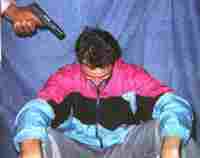
61 reporters have been killed in Iraq, according
to Committee to Protect Journalists, 77 including assistants says Reporters Sans Frontiers (CNN's Jordon counts 102*), almost as many as the entire Vietnam
War (66) or World War II (68) in a much
smaller area in less than 3 years. The anarchic
terrorists have targeted journalists directly,
although once they’re gone nobody will care what the insurgents do- terrorism requires
media- and the exposure of the violence is
turning Americans against the War. If they’d succeeded with that 3
truck bomb attack on the central Baghdad
reporter hotel, almost all media would have
fled. Carroll’s nightmare is made more heartbreaking
by her youth, beauty, and obvious sensitivity.
"A gentle unicorn, bringing good to
an evil place," an editor calls her
along with the other 3 women aid workers
murdered. I forced myself to watch those
hideous beheading videos, because I almost
toured the area for 6-12 months, and thought
I had to see what these terrorists could
do. Murder is the leading cause of death among journalists in 2005.

Journalism is so savagely competitive that
sometimes the best way to get a job is to
go the most remote extreme place where something
huge is happening… and create one. Some do
it for adventure, some do it for ambition-
but most do it because of a obsessive passion
to see what is happening, and a burning
need to tell people about it. It is
a calling and an honor. So the next time
you scorn the overpaid coifed beauty or suit
on TV, remember that for every one of those,
there’s an host of producers, writers, assistants,
and freelancers who get little money, glory,
or recognition for putting their lives on
the line…. just to tell you about it over
your coffee and Danish. As the late great
David Brinkley said, “Any military action
is ultimately done in the name of the American
people, how are they supposed to be know
what they’re supporting if we don’t tell
them?
So say a prayer for Jill, and thank your
lucky stars she's there providing an
honest clear eyed view, when everyone else
has a spin and an agenda, that brutalizes
the truth.
P.S. US officials released a number of Iraq
woman held, apparently as hostages to cause
insurgents to surrender, a terrible precedent
that will lead to even more journalist kidnappings.
A sobbing Jill Carroll was shown again in
a soundless video Jan 30th and a second dead-line
passed in February.
Michael Hammerschlag’s commentaries + articles
have appeared in NYT, IHT, Seattle Times, Providence Journal, Honolulu
Advertiser, Columbia Journalism Review, Media
Channel, and Capital Times. He reported from Russia for
2 1/2 years from Murmansk to Kiev to Lake
Baikal, wrote for Moscow News, Tribune, Guardian + Times, Novaya Gazeta, and
We/Mui; did radio reports for several stations,
and questioned almost everyone in the Russian
government. He returned to Russia, Europe, + Ukraine in 2007. His web page is http://HAMMERNEWS.com , mail: hammerschlag@hotmail.com TWIT: @mkham11